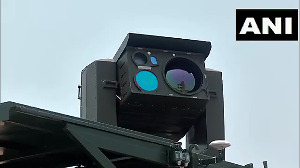When the East Asian currencies, markets and economies went for a toss six years ago, nothing happened in India. When the Indian stock market went through crises in 1992 and 1994, no one outside took much notice.
India could suffer a drought-induced recession or enjoy a deficit-driven demand boom, in both cases it would be an internally driven dynamic.
The global business cycle had hardly any domestic impact, except when the ups and downs involved oil. It was only in 1999-2000 that India joined the global internet bandwagon and shared in the subsequent bursting of the bubble.
Now that process has been taken forward: more markets than ever before have got linked to global cycles. It is now a different game. Companies and businessmen have realised this.
But many investors are only dimly aware of the changed rules, and the farmers not at all. A globalised India has to track global currents in a way it has not needed to do in the past; whether we like it or not, decisions in Brussels and Seoul, New York and Tokyo, matter as much as what is being done in New Delhi.
Today, a staggering two-thirds of the free-floating stock in India's leading quoted companies are held by foreign institutional investors.
This year's stock market boom has been fuelled essentially by the dramatic increase in FII inflows, a consequence of the excess money sloshing around in the rest of the world.
But how many among us understand the drivers of this global liquidity, which determines our stock prices? And as the international hedge funds have moved in for the first time, India's stock market could also get more volatile.
It isn't just the stock market where the price surge mirrors similar surges in China, Brazil, Russia and any of several other countries. It does so in the debt market too, through interest rates.
If RBI keeps the rates too high, more money flows in and drives the rupee up further. RBI has gained autonomy from North Block, but has to listen to the markets in a way it did not before.
Turn to commodities, and the story is the same. A year ago, most commodity prices were down in the dumps, and all of India's commodity companies were wringing their hands in despair. Steel Authority shares were quoting at Rs 7; today they fetch Rs 45.
Because steel is now booming globally and India's steel companies are laughing all the way to the bank. But do we know how long steel demand will hold up in China? India's farmers too now feel the pressure of global swings in the prices of palm oil, rubber and coffee; tomorrow it could also be wheat and rice.
And, of course, the system is much more trade-driven now than before, with exports and imports together accounting for over a quarter of GDP (twice the level a decade ago). As new free trade agreements come into play, the trade-intensity of GDP will grow further.
So, it matters to Indian businessmen and investors what is the rate of recovery in the US, what Alan Greenspan has done to American short-term interest rates, whether China will drop the yuan's value, whether there is a drought in Malaysia or Indonesia, or a currency crisis in Argentina. So track all of those, in addition to El Nino.
These changes reflect the changes in the corporate sector. Between a third and a half of the 100 largest American corporations have set up their tents in India; a decade ago, there would have been barely 10 or 15 out of the top 100.
Our largest companies in some fields are now Korean (white and brown goods). All but one or two car companies are foreign-owned. So when Daewoo goes belly up in Korea, Indians lose their jobs in UP.
In insurance, telecom and other sectors that have been opened up, the international presence is significant, if not dominant.
All these companies will constantly weigh their India options against options elsewhere, before deciding which market to focus on, which one to invest in. And the important point is that the process has just begun. Even today, India is one of the least globalised among the economies of any consequence.






 © 2025
© 2025